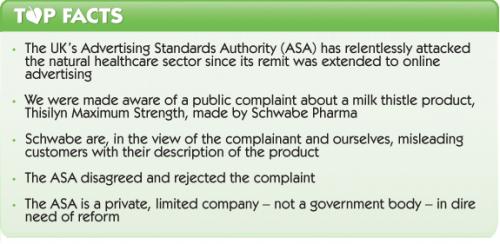Occasionally, the bias of supposedly impartial, official regulators against some of those they are meant to regulate is so blatant as to be laughable – unless you’re caught in their sights, that is. Such is the case with the UK’s Advertising Standards Authority (ASA) and natural healthcare. And that’s without considering the implications of the fact that the ASA is not a government body, but a private company.

A taste of their own (herbal) medicine
Ever since the ASA’s remit was extended to cover online advertising on 1st March 2011, it has gone after natural healthcare practitioners, modalities and products with a vengeance.
The ASA does its best to portray itself as a government body, but it’s actually a private, limited company with an entry at Companies House (company no. 00733214). And, although it boasts of a new ‘legal backstop’, it’s unclear how this will work in practice. An organisation tasked with eradicating misleading advertisements is actually mislabelling itself.
Even so, the real question is: If a private company regulates the media, does it do so with a fair hand and treat everyone equally?
We were made aware of a case last week that suggests otherwise.
Thisilyn Maximum Strength
When representatives of Schwabe Pharma aren’t found lobbying the halls of Westminster trying to get high-quality food supplements removed from shelves, the company is churning out products like Thisilyn Maximum Strength (Thisilyn Max). This product is an ‘herbal medicine’ because it’s been granted a Traditional Herbal Registration (THR) by the UK’s medicines regulator, the Medicines and Healthcare products Regulatory Agency (MHRA).
Don’t let that designation fool you into thinking it’s any good. Thisilyn Max contains an extract of milk thistle (Silybum marianum). It is extracted with acetone – AKA nail polish remover. Its full list of ingredients includes a mix of artificial polymers and additives. Compare this with legally available, botanical food supplement forms containing more silymarin, powdered whole herb and no artificial ingredients – and which are threatened by the MHRA.
A public complaint
A complaint was made by a member of the public about Thisilyn Max, the grounds for which were simple:
- The name ‘Thisilyn Maximum Strength’ clearly implies that the product is more potent than its competitors, or at least as strong as the most potent registered. However, this description is misleading since UK THR products have been licensed with higher silymarin levels — and these ones are not labeled as ‘maximum strength’
- The complainant was also frustrated that she had derived no benefit from the product. This may be surprising to anyone familiar with milk thistle, given that both traditional and orthodox medicine view it as having hepatoprotective effects. However, the scientific and clinical literature indicates that doses of the key active ingredients, standardised by silymarin, some four to six times greater than the amount in Thisilyn Max would be needed to provide significant benefit.
In addition, we were surprised by the MHRA-approved therapeutic indication for THR milk thistle products like Thisilyn Max: “Occasional over indulgence of food and drink such as indigestion and upset stomach”. This indication – dyspepsia – has not been studied in the scientific literature, other than in a single citation where milk thistle was one component in a complex mixture. Another reason why we’re not surprised it didn’t work!
ASA response: Nothing to see here
So what happened? You’ve guessed it: nothing. The ASA rejected the complaint, because:
- “We regarded that consumers were likely to understand that the ‘maximum strength’ claim in this instance referred to the different amounts of Silymarin between [Schwabe’s] two [milk thistle] products”
- “We understand that Thislyn [sic] Maximum Strength Milk Thistle Capsules are authorised by the [MHRA]...to relieve the symptoms associated with occasional over indulgence of food and drink, such as indigestion and upset stomach...we can’t reasonably object to the advertisers describing benefits in keeping with that in their ads.”
Advertising Double Standards Authority
Seemingly, the ASA is perfectly happy for companies to make low-dose products carrying ‘maximum strength’ labels, and then to mislead people as to their likely effectiveness. That is, if these are big companies that are part of the system, making herbal products authorised by European and British authorities.
Clearly, reform of the ASA, established back in 1962, is long overdue.
ANH Nurture Traditional Medicinal Cultures campaign page








Comments
your voice counts
23 January 2014 at 3:41 am
Thank you.
Your voice counts
We welcome your comments and are very interested in your point of view, but we ask that you keep them relevant to the article, that they be civil and without commercial links. All comments are moderated prior to being published. We reserve the right to edit or not publish comments that we consider abusive or offensive.
There is extra content here from a third party provider. You will be unable to see this content unless you agree to allow Content Cookies. Cookie Preferences